
The Ichneumonidae, also known as ichneumon wasps, ichneumonid wasps, ichneumonids, or Darwin wasps, are a family of parasitoid wasps of the insect order Hymenoptera. They are one of the most diverse groups within the Hymenoptera with roughly 25,000 species described as of 2016. However, this likely represents less than a quarter of their true richness as reliable estimates are lacking, along with much of the most basic knowledge about their ecology, distribution, and evolution. It is estimated that there are more species in this family than there are species of birds and mammals combined. Ichneumonid wasps, with very few exceptions, attack the immature stages of holometabolous insects and spiders, eventually killing their hosts. They thus fulfill an important role as regulators of insect populations, both in natural and semi-natural systems, making them promising agents for biological control.
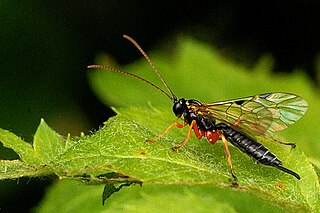
Pimplinae are a worldwide subfamily of the parasitic wasp family Ichneumonidae.

The Metopiinae are a worldwide subfamily of the parasitic wasp family Ichneumonidae. Metopiinae are koinobiont endoparasitoids of Lepidoptera. There are 26 extant genera. A bulging shield-like face is diagnostic for members of this subfamily, but many members lack this character.

Anomalon is a large genus of parasitoid wasps belonging to the family Ichneumonidae. This may be the only genus in the tribe Anomalonini, although Neogreeneia Viereck, 1912 is sometimes considered a valid genus of the tribe.
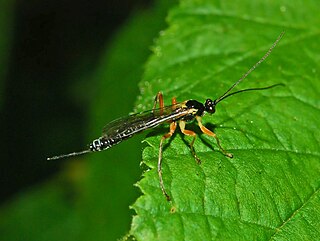
Polysphincta is a genus belonging to the family Ichneumonidae subfamily Pimplinae.

Lusius is a genus of parasitoid wasps in the tribe Phaeogenini Förster, 1869 or Alomyini Förster, 1869, first described by Pierre Jules Tosquinet in 1903, published after his death. The genus is similar in appearance to species in the genus Heterischnus. Lusius occurs in the Oriental, Afrotropical, Neotropical and Australasian biogeographical regions.

Tromatobia is a genus of ichneumon wasps in the family Ichneumonidae. There are at least 4 described species in Tromatobia. Species in this genus are parasites of egg sacs of spiders from the families Araneidae, Clubionidae, Philodromidae and Theridiidae.
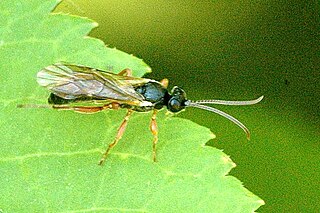
Triclistus is a genus of ichneumon wasps in the family Ichneumonidae. There are at least 90 described species in Triclistus.
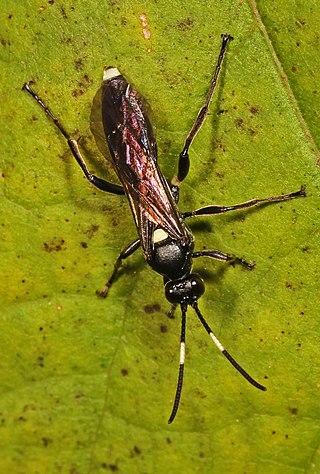
Vulgichneumon is a genus of ichneumon wasps in the family Ichneumonidae. There are at least 30 described species in Vulgichneumon.

Acrodactyla is a genus of insect belonging to the family Ichneumonidae.
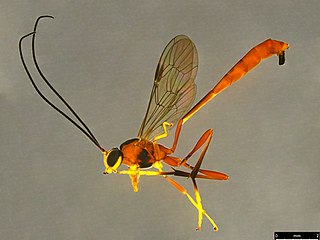
Habronyx is a genus of parasitoid wasps belonging to the family Ichneumonidae. The species of this genus are found in Europe, Australia, and North and South America.
Meloboris is a genus of parasitoid wasps belonging to the family Ichneumonidae.
Eriborus is a genus of parasitoid wasps belonging to the family Ichneumonidae.

Gregopimpla is a genus of parasitoid wasps belonging to the family Ichneumonidae.
Hoplismenus is a genus of parasitoid wasps belonging to the family Ichneumonidae.
Notosemus is a genus of parasitoid wasps belonging to the family Ichneumonidae. There are about eight described species in Notosemus, found in Europe.
Habronyx fulvipes is a species of parasitic ichneumon wasp. It was renamed by Townes, Momoi and Townes in 1965 ; prior to that the species had been named Habronyx chinensis, chinensis meaning "China", in 1955 by Japanese entomologist Toichi Uchida. The holotype and allotype were collected by R. Mell. The species was first named Exochilum Chinense by Morley in 1913.

Glabridorsum is a genus of parasitoid wasps in the family Ichneumonidae. The genus was first described by Henry Keith Townes in 1970, and is known to occur in Australia, New Zealand, India, Nepal and Japan.












